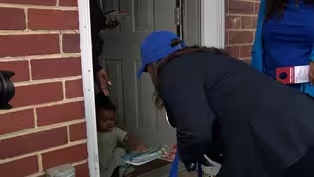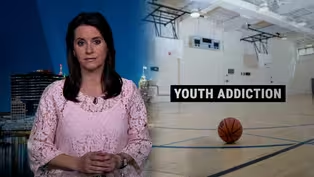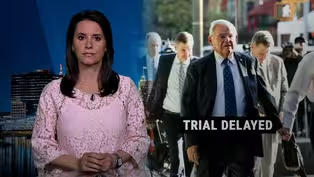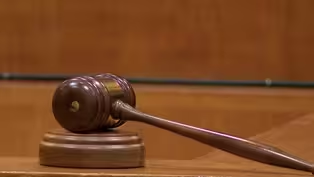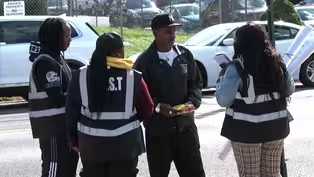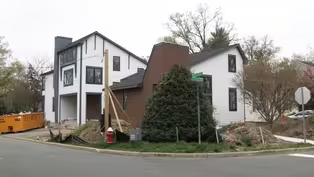NJ Spotlight News
Rutgers medical school deans discuss proposed merger
Clip: 4/19/2024 | 30m 20sVideo has Closed Captions
NJ Spotlight News Health Care Writer Lilo H. Stainton joins the discussion.
Dr. Amy Murtha and Dr. Robert Johson make the case for Rutger University’s controversial proposal to merge its two medical schools, in an interview with Michael Hill on the Newark Today radio program. NJ Spotlight News Health Care Writer Lilo H. Stainton joins the discussion.
Problems playing video? | Closed Captioning Feedback
Problems playing video? | Closed Captioning Feedback
NJ Spotlight News is a local public television program presented by THIRTEEN PBS
NJ Spotlight News
Rutgers medical school deans discuss proposed merger
Clip: 4/19/2024 | 30m 20sVideo has Closed Captions
Dr. Amy Murtha and Dr. Robert Johson make the case for Rutger University’s controversial proposal to merge its two medical schools, in an interview with Michael Hill on the Newark Today radio program. NJ Spotlight News Health Care Writer Lilo H. Stainton joins the discussion.
Problems playing video? | Closed Captioning Feedback
How to Watch NJ Spotlight News
NJ Spotlight News is available to stream on pbs.org and the free PBS App, available on iPhone, Apple TV, Android TV, Android smartphones, Amazon Fire TV, Amazon Fire Tablet, Roku, Samsung Smart TV, and Vizio.
Providing Support for PBS.org
Learn Moreabout PBS online sponsorshipDean Murtha and Dean Johnson I'm Michael Hill with WJBO Lilo Stainton is on from NJ Spotlight News NJ Spotlight News thank you so much for joining us thank you for having us I'll go ahead and get started here uh for a lot of people who are trying to understand the rationale for merging the two medical schools would you explain to us uh the rationale for this why is this better to to do this oh Amy do you want to start you want me to to take a go ahead on this one Bob sure okay I've been around longer longest and so I think I I have the background on it New Jersey's had two medical schools in one University for quite some time both the school in New Brunswick and the school in nework had been part of um D&J and then when UMD andj became part of Ruckers they were H Again part of Ruckers and it was two medical schools and one University and the problem with that was the schools began to compete with each other so medical schools have a job of training and producing new doctors and so the schools uh attract students we recruit students and so we were competing with each other for students we were competing with each other for research grants we're competing with each other for faculty and it really made very little sense to continue to do that the other thing is that separately we were midlevel medical schools and sort mid-level as far as size when we come together we become one of the largest schools in the United States either one or two once uh once the uh merger is is completed that gives us a great deal more power uh more power because we don't have to compete with with for students but more power in attracting faculty from across the country more power in bringing research dollars and very importantly more power in philanthropy because which is one of the things we really really need so that was that's part of that rationale uh it would create New Jersey a very large First Class Medical School that uh competes very very well with what goes on in New York and Philadelphia but what about yes go ahead Leo am you wantan to add anything to yes I mean I think the only thing I would add you know I've been here just a little over a year and a half and um have come to appreciate the competitive nature of both of the schools in their current status and um and see the added value of the schools coming together and partnering and and even in the initial work that we've seen some really wonderful things have come from bringing groups together in a collaborative way around building the new medical school so really excited to be able to see that happening and take some of the competition out of both campuses and to Bob's point we will be as the ruer school of medicine one of the largest schools in the country which gives us not just power and influence in New Jersey but really across the country and that Prestige is really I think going to elevate what we're able to do not just to train medical students but in care delivery for the state which I think is desperately needed but won't there still be two won't there be some level still of competition now if you have two separate places where you're teaching there'll be two campuses yeah yes I I'll start Bob then you can go day good and and so right now the campuses are always competing for resources under the single umbrella um we are actually sharing practices so that we can do things in collaboration and partnership instead of competing in those spaces and so that will take some of that competition out we won't really be competing for students on either campus because we'll be recruiting through the through the ruer school of medicine and allowing students to help actually decide which campus they want to have most of their experiences on we will both benefit from being a combined medical school because we can share experiences for students can share experiences on both campuses so there really will be I think an elevated added a benefit and the other thing that Bob alluded to the opportunity for philanthropy and competing in the philanthropic space um makes us disjointed and not partnered and collaborative but if we're together as the worker School of Medicine the opportunity for us to leverage significant resources to be able to really Advance the Health Care delivery and training actually mostly training in in U for the state of New Jersey so Bob what what would you like to add to that yeah no nothing else other than we one of the things that's happened over the last U I guess it's been about almost a year now where we've been going through this process our faculties have come together and have more than 300 faculty are involved in this process of developing the plan for the Rucker school of medicine and they're already beginning to work together and so they the and that's really shown how much better we can be when we we're working together the other thing is that we will still maintain our clinical practices and our commitment to the city of New York in the New York area to the city of New Brunswick our involvement with University Hospital in New York involvement with the Robert Johnson University Hospital in New Brunswick so all those things will go on under one umbrella and so I so the the competition um will not uh be the the same nature will'll be working together to develop programs that will benefit the state as well as benefit each of the regions Leo yeah I'm I mean this is thank you for including me in this Michael and welcome Deans this is really interesting I'm you know some of this sounds very sort of theoretical um I'm curious I've had an interesting conversation with Chancellor stum about how students learn today and I remember him telling me that a lot of students learn you know remote they take their class remotely they you know play their lectures at Double speed to get through them and so his his point was that not that the two campuses were irrelevant but where you're located as a student matters less than it might have at one point um can you speak to a little bit what it will be like for the student experience how does it differ for students once you come through the funnel a joint funnel perhaps how it would differ on sort of day-to-day for students than what they're experiencing now well you may want to break that up you know the medical school is four years and basically the first two years are Basics years where you in lectures and the lectures could be given at at any place although I like to see students in school I don't think we we really want them to be aware and in school they need to receive the information and then they need to have we need to go over that information we do that with small small group learning and so that is required to be on site but the other part of medical school is the last two years which is all the clinical years and you have to be in a hospital to do that you have to be able to have the mentorship of Faculty uh at the hospital or in the office or someplace like that so the student experience um will allow our students and we haven't really worked all of this out yet but theoretically students could work in in in two different places uh but it will give students much more opportunity uh if they if we're combined yeah I think if I could just add um medical education in the postco time is changing like we are we know and in the AI world is changing so the opportunity for us to leverage technology and Innovation across the campuses will grow and in ways that um I know I and uh probably can't even imagine at this point right but we know that that's coming because we see that happening really quickly and Bob and I were just at the council Dean's meeting we had lots of conversations about the use of AI and medical education and in a clinical care delivery so um I do think that the the students will benefit from each other on each campuses and the structure that we've created to bring the schools together has allowed for the groups that are expert in this work to come together across campuses identify best practices share opportunities across campuses and then understand where there's things that need to be resolved and working through those things so that's the 300 people that are 300 plus people probably that are actively working on moving this forward for us but it's an ex sorry you don't mind I have a followup it's sort of my understanding again is is when it comes to sort of combining things it's it's maybe there there's the student students there's the faculty and research group and then there's the clinical practices and and my from my conversations I'm understanding that the first two groups if you put research and faculty together and make it one group th those those are somewhat easier to combine because you're you don't have the same sort of outside Contracting when it comes to the clinical staff you're Contracting with different hospitals right because they're working in in uh or or at Robert Wood how do you see them that evolving um go because I know this is a point you know this is probably something you've heard a lot about but this is certainly from wor from we've heard we we get those questions as well yeah you know sorry Bob I'm going first this time um I I think um the first and most important thing that I think Bob and I would both say is that our commitment to our communities remains unchanged and whether you know University Hospital and nework and in Brunswick um that's how we serve our community now and we need to continue to expand the service to our communities and our medical schools but that's the number one priority from a care delivery perspective so how you know I guess right now I'm not sure that we envision that actually really coming together um we envision staying committed to the communities that we serve as we've committed to um all along we're not moving anything around we're not forcing faculty to go One Direction or the other none of that is happening our involvement with Clinical Services throughout the state is very important we have contract as you mentioned contracts uh with a number of different hospitals in the New York area it's with primarily University hospital but there are contracted services at Beth Israel Georgia City Medical Center Mountainside St Barnabas all over and that will continue because that's where our doctors provide toide care but remember our primary job is to train students we also develop research but in addition to that we provide highly efficient High expertise Services Clinical Services and we will do that throughout the state where we need it that won't be changed significantly by the by the merger do you see this sorry Michael do you see this as strengthening the Rucker's Health brand that that provider brand it it just changes the name will streng because you know if you go out I me just mentioned we were both at the Council of Deans meeting uh which is all the Deans in the United States 158 I guess now Medical School Deans uh and uh it was been so confusing to explain what's the difference between New Jersey medical school and robwood Johnson Medical School and I know for all the years I've been on there I just forget it it's just Ruckers Medical School the Ruckers brand is a very strong brand and we'll be able to just put that forward and and when it comes to raising money philanthropy that will be a major uh support of that effort I have a two-prong question here and it has to do with um Ruckers and uh the school uh University honoring uh the nework Accords uh from the 19 late 1960s there's great concern that this is uh this merges violating New York Accords and I know that the city of New York has great concerns about the care the level of care at University Hospital for New York residents black and brown residents mainly in New York uh can you assure them can you give the mayor in the city of New York a guarantee that the level of care is going to improve at University Hospital you know I Michael I know that everyone is concerned about that and I've been practicing medicine in New York for for 50 years and one of the things that we have done right out of the ballpark out the gate is meeting with the mayor meeting with the members of the elected officials also meeting with Community groups University Hospital has a community advisory Bo we met with that board and every time something changes I've seen this over the time there's always the fear that we will move away from our commitment to nework that will not happen we have I've been a member of the the medical staff at University Hospital and his predecessor for all of that time uh we University Hospital in New York is exceedingly important for achieving our clinical missions as well as our educational missions uh and we have a a a moral responsibility I was there when I saw the buildings being torn down to build our campus and morally we are committed to care in this community we have a u legislative requirement because the the bill that created Brandon into into Ruckers requires that University Hospital have New Jersey medical schools it's principal academic affiliate and we have a contract with University hospital so that will not change and I don't know how many ways we can say it but our commitment to the people of nework and New York Community is 100% and we're not going to move in addition to that we're building new buildings in north and so would make no sense for us to you know spend money renovating the Medical Science building building uh new facilities to do that in addition to that we are working with University Hospital to improve University Hospital uh one of the things that's going on right now is improving the emergency room and our our doctors work in that emergency facility and we work with University Hospital to develop that plan so I fully understand the concern but let me uh say again and again we there is no reason to have any concern we're not going to move for the answer you used you said improve the care yes say and one of the things that happened over 50 years we have worked with many many efforts to improve care you know when I first came to New York we were involved in a a lead problem and so we had kids with lead poisoning and the medical school work with the city of New York to develop a lead program I developed adolescent medicine and we worked with nor to address teenage pregnancy I worked with HIV and we worked with nor to develop HIV treatment and well as well as develop a Health Care system for HIV that led us to have some of the best outcomes in the in the country and most recently we worked in the city of New York to uh to respond to the covid pandemic so you know we've been providing lots of care to the people of the city of New York it's possible to say what the city would have been like without the medical school but you can turn look at the things we have done over half a century and that is an indicator of the things we'll do as we move forward you know there's also concern about the facilities there that you you raised uh at University Hospital in Newark and and there's concern that and I have to ask this question how are New York stakeholders to have confidence in this merger when the governor himself is under budgeting what university hospital says it needs right away to begin reconstructing the hospital Michael you you point to two things one is the University Hospital is not us and we we work with University Hospital to the governor and I would suggest the people of city of New York they should petition their legislators as well as the governor to have the state provide the resources that the city needs to improve University Hospital it is a is an old facility I would I saw being built 50 years ago and it needs to have lots of lots of improvements there is a plan but the state needs to provide the resources or help us get the resources to improve it really quick points Michael um Yes again I've been here for a relatively short period of time and I I think one of the besides the legislated agreements and the you know the the longstanding commitment it's a pride point for New Jersey medical school and for recors to have that affiliation with un it's it's something that we value actually and we um it's part of our training for our medical students so I see it even sort of One Step Beyond that and and I don't know from a promise perspective whether or not we're going to improve care but I do think that our ability to do the things that we need to do as a medical school um will be enhanced under that Rucker School Medicine brand that goes from again we talk about but even faculty Recruitment and student recruitment as well so I think there's a lot to that relationship that's important I if I can follow up I don't mean to belabor the point but I do think this is the you know sort of the fun the most fundamental question is patient care obviously there's the medical school and its future but sort of from the public standpoint patient care is their kind of priority at least in Newark um and I'm really glad you noticed that Michael did say improve care not just maintain the the commitment because I think that's critical and that brings me to a point that I hear often is that regardless of what's being done in Newark something more is being done in New Brunswick and there's a perception and I haven't run the numbers myself but from the basic things I've seen you know there are hundreds of millions of dollars being invested in the Helix project in in New Brunswick and when you hear numbers about being invested in nework they are large but they may not be that large how can you speak to that sort of it's this sort of profound sense I think in nor that they are always catching up and that and that you know which leads to people being less than grateful when you know they hear that the services will be maintained you know I think this is kind of fueling this underlying question um can you speak to that sort of difference at all you me you want to take it or you want me to take it I mean I you know I think yeah we have to take a broader view Newark had different than New Brunswick right and when it comes to improving the health of the region there is much more that we need to do to improve the health of our region in Newark than improve the medical school for example we just a few years ago got a supermarket that carried fresh food that's a major thing the other crisis we have right now is that large pharmacies in our community are closing we need improv housing stock and that is that is beginning to happen and we also need improv educational system so all of these things we work on or have an effect on the health of the community so it's not just hit for T New Brunswick doesn't have all these problems and it is a college town and it's been that way for quite some time as far as the dollar for dooll thing I don't know I think if you look at the dollar for dooll it is probably probably given the improve the what needs to be done at University Hospital and a half billion dollar Improvement in the Medical Science building it is probably an equivalency but that's not it we need to do what needs to be done in each community and we need to look at the broader issues rather than than tabulating you know what what what dollars were spent the other thing is that if you look at at all the pieces that go on if you look at the research part of the medical school there's more research activity in nework D in New Brun but you know we want to bring our school together work together to do the things that are needed uh the job of the medical school is actually produce Health Care Providers and to bring the faculty together that produces those Health Care Providers and that's what we want to do when it comes to Health Care it requires more than just the medical school it requires the hospitals it requires the doctors it requires the community and we have been working Tardis with Newark to do that but you know I I and I I you know whenever I talk about this you know I I I can understand that people just think of the school as a health care provider because many of us do provide health care but we're more than that and in order to provide improve the health of the community it takes more than just the school I mean I've seen statistics that 70 80% of your health care is impacted by your social determinant right not the medical system down the street or if your access to care so yeah yeah focusing on education food security um the carsal system but there's a whole host of things that impact your health and wellbeing of of a community so yeah and we realize that and we we work with the community to do that to address some of those issues but it just it's not just us it's it's a larger group of individuals and both schools work in the community with projects in the community but it takes more than just the things we can do it takes everything and quite frankly we need this is gonna give me in trouble we need a health care system that is designed to make sense what does that mean what does that mean Bob you're not in trouble we don't we don't need a health care System where we're big instit us compete with each other uh and unfortunately that's one of the things that that goes on so across the country across the country yeah yeah and we also need a health care system that is free um but now I'm really getting what do you mean by free what do you mean by by free I I think that people that everyone I think Health Care is a right right and that we should that we do better if people were able to assess Health Care Services uh without excess cost without costs and you know there have been and if if we had really gone full bore with the Obama health plan or if we' Gone full boore with some of the other plans we would have a healthare system where people uh where we were were able to have better planning and that would not be so costly to receive the health care that we need but wouldn't that take the profit out of Medical Care the profit out of medical care I don't I don't think it would take the the profit out of it but it and you know you're getting getting to an area where I'm not an expert but what I do what I see is my patients and I see my patients who are not able to get the services they need because either they don't have insurance or they have insurance that is not effective insurance and you know that's that's and that's what I and you know I I still see patients three days a week that's what affects me most and uh when I was younger I developed a healthc CARE program in New York in New York City that was free of charart and U the young people in that program did very well but um you I don't know if we're ever gonna get there because this requires a federal solution um and not justce and just to restate again health and well-being of a community is dependent on a multiple on multiple factors health care delivery is a tiny fraction of that actually that contributes to health and well-being of a community so we can provide health care but but without the other things in support of the community's needs we'll never get to health and well-being I'm trying to get yes when does the merger take place when does it finalize so um I'll start on that one Bob so um the board voted last July um we've been now um working through the creation of a structure that allows us to get um accreditation from the liaison committee on medical education so the lcme that process to get that accreditation takes a significant amount of time and we expect we'll be submitting our application I think in 27 expecting to enroll the first class under the rer school of medicine uh name in 2028 so it won't be until 2028 until we're enrolling that first class A lot of work has to happen between now and then to get us ready for that and the structures that we've created um allow us to focus on the lcme accreditation but also we've created an iterative process with a series of advisory task forces that um we will continue to add we had eight that we launched last week we had over 200 people that volunteered to serve on these advisory task force es they're basically looking at what's happening at each School in a specific area of interest and looking for areas where there's uh best practices that we can unite and then areas of conflict that they're either proposing suggestions or referring to the executive committee for resolution that work will continue all along because it's insufficient to just focus on the LCD accreditation we need the stakeholder input on a variety of issues that we're learning every day new things that people are concerned and worried about so we really appreciate that input who's going to be the one leader of the medical school because isn't that part of the accreditation process yeah the accreditation process requires that there be one leader uh one Dean and uh what will happen when we get closer to the the final date the the chancellor will appoint the dean that will will require a national search uh to do that but that person or individual has not been designated yet it won't be one of you it could be but um we certainly um can't say at this point right now um I have a medical school Amy has a medical school our job is to uh produce the combined recer school of medicine and that will have a governance process and once that governance process goes into effect uh we we'll have to go through the process of designating the dean Leo I yeah I do have one more question I'm I'm not sure how this affects patient care but it may impact the the merger and and I'm curious in what way but your agreement with um Robert Wood Johnson Barnabas um Robert Wood Barnabas Health how does that come into play here because that's another stakeholder a large stakeholder in this process but in New Brunswick we don't see that affiliation changing at all it is our primary clinical site for our medical student training and also for our resident training and so we don't see that um changing for us in New Brunswick at all I think that as we've said before that clinical affiliation piece is probably the piece that will remain most stable okay um as we move things forward B you agree with that I I agree and in nework we have contracts with with um with facilities and he hospitals that are part of the system Beth Israel the Cooper Superman as well as Jersey City as well as Clara mass and so we're in all of those FS but remember because they're contracted Services those contracts will continue and as as we go through the future you know whatever the health systems do uh it will affect how we relate to them but uh that will not have an impact on the merger the merger will be a merge of schools that will produce Health Care Providers our clinical faculty involv both schools will continue to provide clinical care in all of the fillings that are around us Lilo, you anything else for you all my questions answered right good Dean Johnson Dean Murtha thank you very much you're welcome thank you the opportunity thank you
Door-to-door effort in Camden to highlight free preschool
Video has Closed Captions
Clip: 4/19/2024 | 4m 28s | Schools superintendent and volunteers knocked on doors to promote the program (4m 28s)
Focus on combating opioid addiction in youth sports
Video has Closed Captions
Clip: 4/19/2024 | 3m 57s | Former NFL player among speakers at Atlantic City conference (3m 57s)
Judge agrees to delay start of Sen. Menendez’s bribery trial
Video has Closed Captions
Clip: 4/19/2024 | 41s | Judge agrees to delay start of Sen. Menendez’s bribery trial (41s)
Jury selection completed in Trump trial
Video has Closed Captions
Clip: 4/19/2024 | 5m 42s | Events in court overshadowed as man set himself on fire outside courthouse (5m 42s)
NJ investing millions in new 'crisis response teams'
Video has Closed Captions
Clip: 4/19/2024 | 4m 14s | Murphy and AG announces $12 million in funding for teams in several counties (4m 14s)
Push for 'accessory dwelling units' to beat housing crunch
Video has Closed Captions
Clip: 4/19/2024 | 4m 14s | Some towns have already adopted ordinances to allow ADUs (4m 14s)
Providing Support for PBS.org
Learn Moreabout PBS online sponsorshipSupport for PBS provided by:
NJ Spotlight News is a local public television program presented by THIRTEEN PBS
